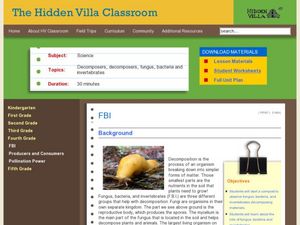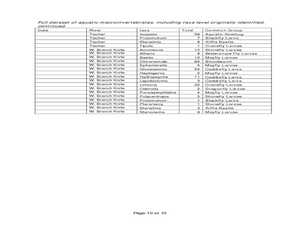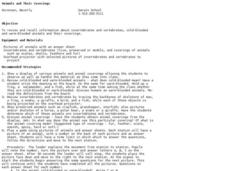NOAA
Invertebrates
Crabs and lobsters ... yum! The 18th installment of a 23-part NOAA Enrichment in Marine sciences and Oceanography (NEMO) program focuses on invertebrate marine life. After the lecture slideshow, learners conduct an activity to sample...
Virginia Department of Education
Animal Phyla and Plant Divisions
Searched hours for an activity that allows individuals the ability to use multiple resources to learn about both plant and animal kingdoms? This discussion and activity provide pupils with the ability to visualize each organism before...
Wilderness Classroom
Ocean Life
Our oceans are composed of many complex relationships. Young oceanographers explore relationships between organisms, understand the world ocean's currents, and discover the effects of water pollution and how it behaves. There are three...
NOAA
Understanding Food Chains and Food Webs
Jump into an exploration of marine ecosystems with the first lesson in this four-part series. After first learning about crustaceans, mollusks, and other forms of sea life, young marine biologists view a PowerPoint presentation that...
Busch Gardens
Create an Invertebrate
What better way for young biologists to learn about invertebrates than by creating their very own? Here, students are assigned a set of invertebrate characteristics and are asked to invent an imaginary ocean animal and a separate...
Curated OER
Invertebrate Diversity
Comparative anatomy prevails in the lesson exploring diversity among invertebrates. Biologists examine physical characteristics of an earthworm from phylum annelida and a meal worm from phylum insecta. They also inspect a cricket and a...
Curated OER
FBI
Fourth graders experiment with compost. In this Science activity, 4th graders begin a worm compost as well as an outdoor compost. Students discuss decomposition.
Curated OER
Microfishing
Learners use a simple method to collect living microorganisms from natural and/or artificial environments and develop skills in microscopy, observation, drawing, speculation, hypothesizing, oral presentation, and raising questions.
Curated OER
Common Pond Plants and Invertebrates
Here is a wordsearch that has learners find 18 different organisms that are commonly-found in pond environments. The monarch butterfly, cotton grass, water flea, and the damesfly are just a few of the organisms found. Colorful and...
Curated OER
Appearances Are Deceiving
Young scientists study creeks around their area to see how clean the water really is. One way to tell is by the invertebrate populations that are present. This lesson introduces a game which learners simulate a variety of species found...
Curated OER
Monoculture and Polyculture
Ecology explorers collect soil and invertebrates from a monoculture and a polyculture area. They relate the number and types of invertebrates to the surrounding environmental conditions. This activity can be used as an introduction to...
Curated OER
Digital Video Lesson Plan: Brine Shrimp
Students participate in classroom experiment to gain better understanding of type of environment brine shrimp can best survive. Students then explore effects of common saltwater pollutants on survival of animals in sea.
Curated OER
F.B.I.
Pupils create a worm bin full of fruit and vegetable scraps wit paper and observe what happens over time. In this decomposers lesson plan, students observe that the fruit and vegetable scraps become new soil.
Curated OER
Invertebrates in Mythology
Invertebrates play a prominent role in many myths across cultures. From Greece to Guatemala, see if you can identify the invertebrate of importance. Ten multiple-choice questions test your knowledge of mythology from around the world.
Curated OER
Ocean Life: A Heavy Subject
Second graders examine The Learning Page Fact Files about ocean life and categorize the data by weight and group. They distinguish between fish, mammals, and invertebrates and which weigh the most and the least. Students record their...
Curated OER
Introduction to Animals
The details about invertebrates and invertebrates give valuable information about the characteristics of multicellular organisms. Examples of nutrition styles and symmetry are interesting. Also, these slides are clear in presenting a...
Biology Junction
Segmented Worms - The Earthworm
In this biology activity, students color and label the different parts of an earth worm. They complete 41 short answers and fill in the blank questions about earthworms.
Curated OER
Aquatic Invertebrates
Students examine the impact that human development has on streams. In this stream sampling lesson students compare macroinvertebrate data and graph it.
Curated OER
What is Soil?
Students examine soil. In this earth science lesson, students define and describe weathering and erosion as it relates to soil. Students compare and contrast potting soil with forest soil and complete a science observation worksheet.
Curated OER
Design a Deep- Sea Vertebrate or Invertebrate
Students design a deep-sea animal. In this research based lesson plan, students research and design a vertebrate or invertebrate that lives in a methane hydrate habitat. They compile a class chart of the adaptations animals have in this...
Curated OER
Invertebrates
Learners examine invertebrates. For this animal classification lesson, students discuss invertebrates and bilateral symmetry. They discuss the importance of horse shoe crabs in medical science.
Curated OER
So You Think You're Tough
Fourth graders learn how to classify animals. In this invertebrates instructional activity, 4th graders discuss how we classify thinks into groups and move into a discussion about classifying animals. Students learn about the differences...
Curated OER
Life in a Forest Stream
Learners assess macro-invertebrates from a stream. In this science lesson plan, students observe, classify and identify organisms found in a stream. A lab station is constructed at the stream sight and learners study the different...
Curated OER
Animals and Their Coverings
Students investigate the coverings of vertebrates and invertebrates and cold-blooded and warm-blooded animals. In this animals and their coverings lesson plan, students observe displays of different animals and discuss and answer...

























